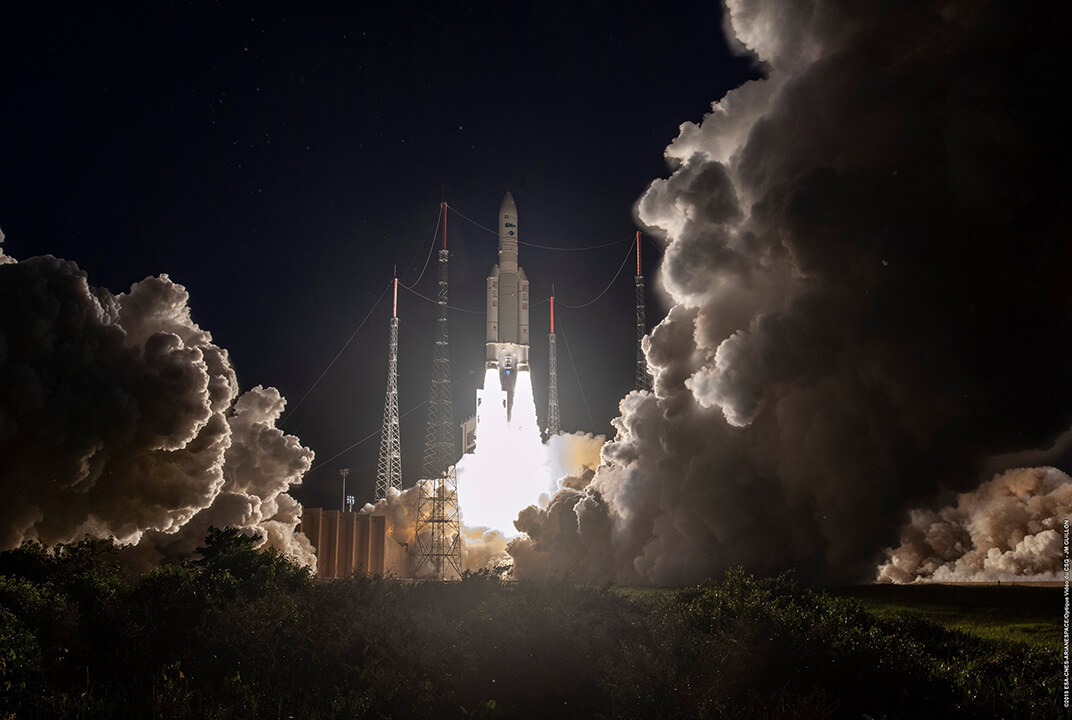What has a satellite done for you lately?
Inmarsat partnered with the Scouts to offer a trip of a lifetime to watch the launch of I-6 F2 and learn about the importance of space to our lives on Earth.
Inmarsat’s second I-6 satellite, I-6 F2, the size of a double-decker bus and with a solar panel array ‘wingspan’ larger than a Boeing 767, launched on 17 February 2023 with SpaceX from Cape Canaveral in Florida, and we invited two special guests to join us for the event.
The I-6 satellites form part of our Inmarsat ORCHESTRA network to deliver even greater connectivity and capabilities to our customers around the world. But have you ever stopped to wonder exactly what a satellite has done for you lately?
Read on to find out, as well as discover how we worked with the Scouts to inspire the next generation and award two lucky Scouts a trip of a lifetime to the launch of I-6 F2.
What is the value of space to people around the world?
In May 2022, Inmarsat asked 20,000 people across 11 countries for their views in our global report ‘What on Earth is the value of space?’ - with some surprising results. Only 8% knew about communication satellites and Gen Zs (10–25-year-olds) were more likely to think about Star Wars and aliens than space missions to the Moon and beyond!
But without satellites our world would be a hugely different place – there would be no GPS systems that navigate the best route for us to take in our cars; no satellite safety and air traffic management services to ensure planes can fly safely; no satellite safety services at sea to protect the lives of millions of seafarers every day; no weather updates; and even no ATM systems that dispense our cash. The list is endless.
The race to Net Zero
And that’s not all. Our second report, 'Can space help save the planet? has demonstrated that satellite technologies can also help in the race to Net Zero.
From reducing shipping’s greenhouse gas emissions and aviation’s carbon footprint to ensuring that farmers can yield the greatest crops with minimal use of water and other resources to monitoring climate change. Today, satellites are decarbonising our world by 1.5 billion tonnes a year, and if adopted globally we could see this rise to 8.8 billion tonnes - that's a greater cut in CO2 emissions than you would get by taking every car off every road, in every country - for a whole year.
Launching the future with the Scouts
A prize of a lifetime to watch a live satellite launch
As we enter what is one of the most exciting periods in space history - the second Space Age - with voyages to Mars and Jupiter and satellites increasingly supporting efforts to combat climate change, we felt that it was important to involve and inspire young people to appreciate the true value of space, its many benefits and the exciting opportunities there are to work within the space industry.
We were excited to partner with the Scouts, the UK’s largest youth organisation, to get 10-18-year-olds thinking about how satellites may help life on Earth in the future – some of their ideas might even be taken on by Inmarsat or NASA.
And the prize for the best ideas? A trip to Cape Canaveral in Florida to watch the live launch of our I-6 F2 satellite onboard a SpaceX rocket!
The compeitition inspired 100s of Scouts and Explorers to submit ideas, with many entries focusing on how space can help care for the planet. Two lucky winners were chosen by non-other than Scouts Ambassador and famous astronaut Tim Peake - 16-year-old Simon Shemetilo from Tower Hamlets in London, and 14-year-old Craig Alexander from Reading. And they got to join Inmarsat for an incredible VIP trip to Florida for our I-6 F2 satellite launch!
- Craig from 95th Reading Scout Group won the 10–14-year Scouts category with his innovative idea to harness clean solar energy from satellites for a new energy source on Earth, to address both climate change and rising living costs.
- Simon from Endeavours 5th Tower Hamlets won the 15-18-year Explorers category with his ingenious solution to reduce the environmental impact of data storage by building a network of satellites to create a space cloud web.
If you would like to know more about satellites and what they are doing to help us every day then download our report on the value of space.
Discover more about our satellite communications by watching some of our videos:
- ORCHESTRA Vision
- ORCHESTRA Technology
- I-6 F2 Technology
- I-5 F4 launch
- ELERA

